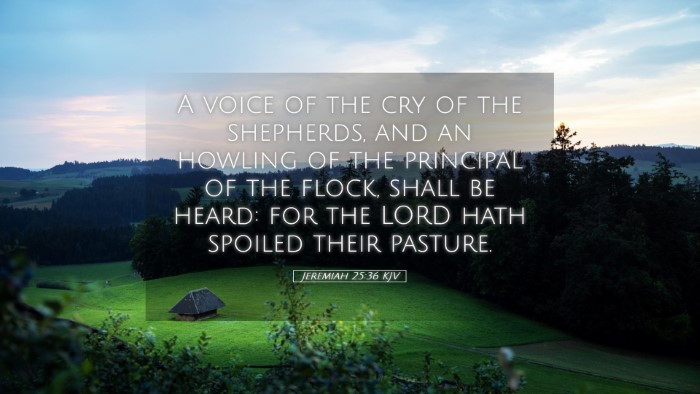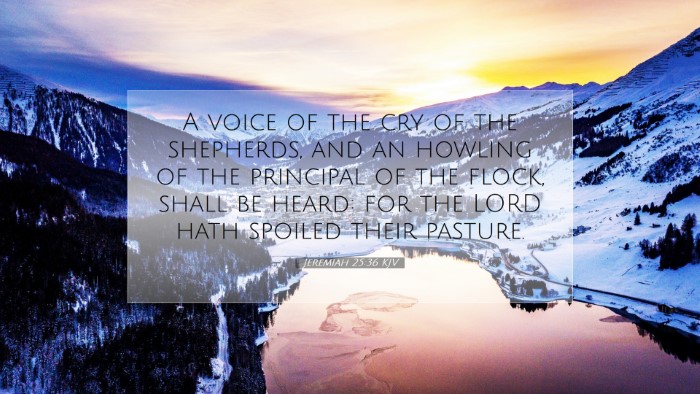Commentary on Jeremiah 25:36
Verse Context: Jeremiah 25:36 states: "A voice of the cry of the shepherds, and a howling of the principal of the flock shall be heard: for the LORD hath spoiled their pasture." This verse is situated within a larger prophecy regarding the judgment of God upon Israel and the surrounding nations. It reflects a significant theme throughout Jeremiah's ministry—a call to repentance and a warning of impending judgment.
Introduction to the Commentary
Jeremiah stands as a prophet of deep sorrow, his ministry characterized by the deliverance of grim tidings and calls for repentance. This verse encapsulates the lamentations of the shepherds and the flock, showcasing the devastation that follows divine judgment. The public domain commentaries of Matthew Henry, Albert Barnes, and Adam Clarke provide rich insights into the meanings and implications of this verse, elucidating its relevance for pastors, theologians, and students alike.
Insights from Matthew Henry
Judgment upon Leaders: Matthew Henry emphasizes that the shepherds mentioned in the verse symbolize the leaders of Israel who have failed in their duties. These shepherds, representing both spiritual and civil authorities, have led the people astray. Henry illustrates that God’s judgment upon the leaders results in a deep lamentation, a cry that reflects the despair of those who have been misled.
The Howling of the Flock: The reference to "the principal of the flock" conveys the calamity that befalls the people due to their leaders’ negligence. Henry interprets this howling as a natural response to impending disaster—both a cry of anguish and a recognition of the loss of provision and protection that comes from the absence of God’s favor.
Insights from Albert Barnes
Desolation of Pasture: Barnes provides a vivid picture of desolation in his commentary. He notes that when God spoils the pasture, it signifies a withdrawal of divine sustenance. The pastures represent not just physical provisions but spiritual nourishment. The spoilage indicates that God can turn abundance into barrenness, punishing the people for their disobedience and refusal to heed His warnings.
Divine Response to Sin: Barnes underscores an essential theological principle: God's judgment is a response to human sin. He comments that the cry of the shepherds and the howling of the flock should serve as a sober reminder of the consequences of national sin and the accountability of leaders before God. The desolation stems from the failure to uphold justice and righteousness.
Insights from Adam Clarke
The Cry of the Shepherds: Clarke's examination of the text highlights the emotional aspect of leadership. He points out that the cries of the shepherds reflect their despair over the consequences of their misguidance. Clarke emphasizes the profound sense of loss that spiritual leaders experience when they lead their flock into ruin.
The Symbolism of the Flock: Clarke also discusses the metaphorical significance of the flock, positing that it represents the people of Israel who are collateral damage in their leaders' failures. The howling signifies a collective mourning, an acknowledgment of lost hope and the impending judgment that looms over them.
Theological Reflections
This verse raises poignant theological reflections regarding leadership, responsibility, and divine judgment. It resonates deeply within the framework of pastoral theology, emphasizing the critical need for faithful and righteous leadership in spiritual communities. The duality of the shepherds’ crying out and the flock’s howling invites a contemplation of the reciprocal relationship between leaders and their followers.
- Leadership Accountability: Leaders are called to guide with integrity, recognizing that their actions have far-reaching implications for the community.
- The Corporate Nature of Sin: The verse illustrates the communal impact of sin—how the failures of a few can lead to suffering for many.
- Hope Amidst Judgment: Even within the theme of judgment, there lies a thread of hope; the call to repentance is always available, echoing throughout Jeremiah’s messages.
Practical Applications for Ministry
Pastors and church leaders can draw several crucial lessons from Jeremiah 25:36. The emotional weight carried by this verse serves as a reminder of the grave responsibility of spiritual leadership.
- Engage in Self-Reflection: Leaders are encouraged to examine their own spiritual practices and commitments, ensuring they remain aligned with God’s will.
- Promote Accountability: Establish systems of accountability within church governance to prevent moral failures and the resulting corporate sorrow.
- Foster Community Resilience: Encourage the congregation to support one another spiritually, creating an environment that collectively seeks God’s presence and favor.
Conclusion
Jeremiah 25:36 stands as a sobering reminder of the consequences of neglected leadership and the fate of those misled. The insights gleaned from the commentaries of Matthew Henry, Albert Barnes, and Adam Clarke reinforce the importance of sound doctrine and pastoral integrity. For pastors, students, theologians, and Bible scholars, this verse encourages a profound engagement with the realities of spiritual leadership and the urgent call to align oneself with God’s purposes amidst a culture that may falter.


